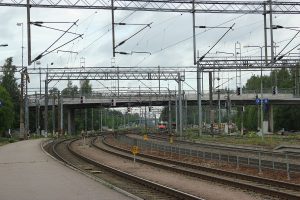In December 2019, Finland provided a wonderful example of investigative journalism. A documentary from Finnish state media YLE tackled the cargo train route from Xi’an to the eastern Finnish city of Kouvola, a route that opened in 2017, and the two Finnish executives behind the venture.
In the city of Kouvola, cooperation with the Chinese is managed by the city-owned development company, Kinno (Kouvola Innovation). This type of city- or municipality-owned development company is common in Finland.
On television, however, the actions of the Kinno men come across as silly, with the documentary even playing slapstick comedy music in the background.
Curiously, the ambassador of Kazakhstan to Finland first pitched the idea of cooperation with China to Kinno. This, however, came with strings attached. According to the Kinno executives, the Kazakhstani side refused to partner with any multinational logistic experts, and the lack of one has clearly hampered the operation. As it turns out, the Kazakhstani business partner, Unytrade, is in fact a shell company to which the Kinno executives have previous links.
According to the Kouvola cargo route advertisement shown in the documentary, the train connects multiple cultures to each other, such as Finland to Russia and Kazakhstan to China. This is of course part of China’s Belt and Road political rhetoric and argumentation. Some European cities, like Kouvola, have embraced it, resulting in China paying for more than half of the train cargo costs in subsidies.
The documentary reveals that Beijing pays massive subsidies for all cargo train routes from China to Europe. That is why train cargo transportation to and from China has grown massively in recent years in various parts of Europe.
In past years, the subsidies paid by China encouraged Europe to increase the number of cargo trains between China and Europe, even if they were shipping nothing but air. Last year, however, China stopped paying subsidies for empty trains, thus halting Kouvola operations.
The Kouvola venture has also been granted EU subsidies. The funding application stated that a continuous train connection to Xi’an is a risk-diminishing factor. Now, however, due to a decision made in Beijing, there is no continuous connection.
Despite the fact that the trains are now standing still, based on China expectations Kouvola is continuing to build a massive cargo terminal, costing around 40 million euros ($44 million). EU subsidies for the 1 kilometer-long terminal amount to 8 million euros. This is despite the fact that Kouvola already has an intermodal terminal with a capacity of one train per day.
In the documentary, the viewer learns this through a local Kouvola father who runs a carting track, its existence threatened due to the new cargo hub. Unfortunately for the business developers, the man was more than capable of making sense of the figures. According to him, the Kinno calculations do not add up.
The Kinno executives, however, are adamant that their business plans hold water. They are now looking at linking with Chengdu, after the failure of the Xi’an route.
Something not discussed in documentary is whether the Kouvola-Xi’an (or possibly Chengdu) connection is lucrative in the first place. All land cargo not bound for or coming from the relatively small Finnish markets would have to be transferred on lengthy sea routes via Scandinavia or the Baltic states. Add to the equation the hubs for Chinese train cargo in Duisburg and Tilburg, and the already existing one in Vuosaari harbor in Southern Finland, and the geography of it all for Kouvola makes little sense.
In the end of the documentary, the carting track is saved thanks to the heroics of the dad, but the cargo terminal building is pushing forward nonetheless.
The documentary is yet again another example of the public and media mood in Finland turning against Beijing. Through the documentary, state television depicts the debacle as a business planning farce and a tax-payer tragedy, both of which it largely is.
As an international actor, Finland is a curious case. Having a long tradition of balancing between major powers, Finland’s foreign policies are guided by caution.
Even today, when Finland otherwise depicts itself as a champion of liberal values, top-level politicians and government officials are overly discreet in their public statements over China.
Pragmatism is the key, with many China-related infrastructure projects facing concerns about their completion. Then there is Finnair. The grand strategy of the Finnish state-owned airliner is based on its Asia routes, particularly to China.
Toeing the pragmatist line, Finnish politicians do not publicly condemn ventures such as the Kouvola-China train connection.
Through the media though, which is increasingly critical of China, Beijing is facing a backlash that influences popular opinion and thus the political environment in Finland. In the long term, this might not be easily fixed.
Jukka Aukia is currently a post-doc researcher at the Centre for East Asian Studies at the University of Turku, Finland.

































